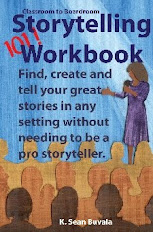
Just the other day, I had a captive audience. But, this audience kept talking back to me as I was telling stories. They had something to say about nearly everything as I spoke. They laughed, too, even at the parts I didn't make "funny."
Was this a rude audience? No! It was a school room filled with junior-high teens (13/14 year olds) and doing exactly what they should do when they listen to stories. I will share with you one of the most important things that I have learned: a quiet classroom of teenagers usually means they are not listening to you. Instead, they are just tolerating you and your presentation.
I have been telling stories to teens and tweens for more than two decades, even before the word "tween" existed. I will just be using the term "teens" for the rest of this article, but know that I am taking about kids between the ages of 11 and 18 specifically. Here are three quick tips for you whenever you are speaking to this age group:
1. Tell Your Face.
When you enter a classroom of teens, do you look like you are going to have a good time? Do you plan on enjoying the next hour or so? Does your face know it? Save the "professional" face for the staid adult events when you have to pretend to impress someone with your history. When telling to teens, smile and enjoy yourself. Mingle with them as they arrive in the classroom. Respond to even the most casual comments made to you before the event.
2. Build Your History.
With an adult audience, I could partially rely on my list of accomplishments, travels and years of speaking experience to get their attention. Or at least get them to quietly applaud. With teens, these histories mean nothing. Your PhD, your 100 years of experience are not something their 13 years of life experience can process. You have to earn the right to be heard. Speak with energy and genuine enthusiasm and be transparent about your purpose. Kids base their evaluation of you based on their (or their immediate peers') direct experience of you.
3. Encourage Response.
Especially in the area of storytelling, I want my audience to build the presentation with me. When teens enjoy you and your work, they will respond to what you are saying and doing. Often this begins with a silly comment or random shout-out designed to call attention to themselves. When you respect and use this initial comment and incorporate it into the story or presentation, you will begin to get comments from the audience that are relevant to what you are saying, not just self-referential remarks from your young audience. Think of these shout-outs as logs to toss on the fire you are building.
When the teens have enjoyed your presentation, they will tell their friends. You would be amazed how fast word can travel in a school. In the few minutes between classes this week, the first group had told the second group how much fun my presentation was. That type of word-of-mouth is invaluable with teens.
At the end of the sessions, a group of girls was standing in a huddle and giggling, scribbling something on a notebook. Finally, the artist approached me and handed me the "portrait" she had done of me (attached to this article over on the left) and said, "Thanks for coming to our school today. We really had a lot of fun."
Working with teens can be rewarding and is a good opportunity to make a difference in the world. Besides, pencil drawing can be among your highest compliments.
***********
The official blog for K. Sean Buvala, storyteller and storytelling coach.








